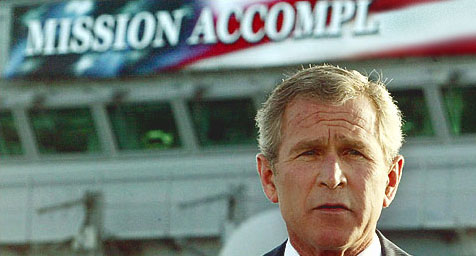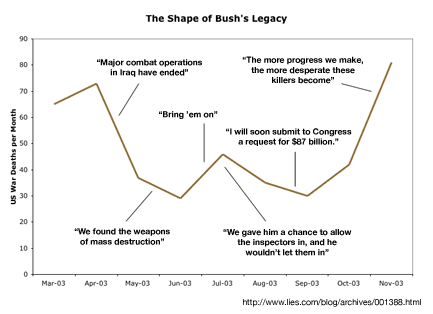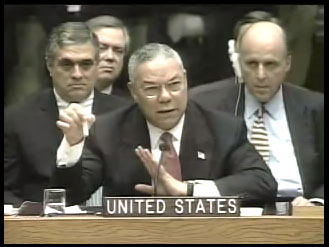A Lies.com Tenth Anniversary Reader
I’ve been so busy that I didn’t even notice at the time, but back in February Lies.com had its tenth anniversary. In honor of that, I did a quick skim through the site’s entire history and jotted down comments about a few of my favorite items. Think of it as something like an audio-commentary track for a DVD. Only, um, without the audio. Or the DVD.
Happy anniversary, Lies.com!
Follow the link below, or scroll down, for more.
First steps
So it begins (February 7, 1996)
It’s caucus time in Iowa, and that can only mean one thing: Our collective store of credulity is about to be drawn down once again. Presidential elections are always colossal lie-fests, but this one promises to be especially bad, with the lack of real issues propelling the candidates to lie early and often, inventing virtues for themselves and vices for the opposition and trumpeting it all with a vociferous zeal guaranteed to leave even the most cynical observer reeling.
It’s gonna be great.
[snip]
Freed from the worry that a particularly bald falsehood might hurt their chances (since they effectively have no chances), the Republican contenders will be able to deliver comforting myths to the faithful and brazen taunts to the opposition unconstrained by petty issues of truth and accountability. And while Clinton will no doubt stick with a conservative gameplan, running play after play up the middle in a savvy effort to grind out the clock, he can be counted on to deliver the usual revisionist pap about his performance over the last four years.
That was the first content ever to appear on Lies.com. My obsession with political falsehood was on display from the beginning, as was my willingness to make confident pronouncements that, with the benefit of hindsight, turn out to have been completely wrong. The ’96 election campaign did not end up being particularly noteworthy in terms of lying. In fact, if recent history argues for anything, it’s that it is close elections that lead to the most-blatant falsehoods. Or maybe that’s just an indication of the direction we’ve been headed lately.
Gimme that
A site by any other name (June 20, 1997)
The lies.com domain dispute (March 17, 2002)
…we have now learned that you have adopted and are using the trademark “LIES” for goods and services very similar to CTT’s parody publications. Furthermore, it has come to our attention that you are utilizing the term “LIES” under the home page address “www.lies.com”. Such usage violates CTT’s common law trademark rights for the term “LIES” with respect to parody publications.
In hindsight, I’m inclined to think that George Rafter, the guy who had his lawyer send me several nasty letters in an effort to make me give him the lies.com domain name, honestly believed he was acting within his legal rights in doing so. Of course, as I learned when I used this then-fairly-newfangled World Wide Web thing to research the question, he was a bit of a doofus to think that.
The final frontier
Go at throttle-up (March 18, 1996)
The end-result of this hubris is depressingly predictable. There will be another shuttle disaster. It’s impossible to say exactly what form it will take or when it will happen, but when it does another crew will almost certainly die.
Shuttle disaster confronts nation with realities of space travel (February 2, 2003)
Sending people off our planet on a flaming bomb and returning them safely to Earth are things that, currently at least, are at the very limits of our abilities. Given a few dozen successes, though, we come to see it as routine, and the public’s interest wanes, and the funding starts to dry up, and decision-makers more attuned to the public will than to the engineering realities of what they’re engaged in begin to cut corners, until some brave adventurers pay for that hubris with their lives.
PhotosFromTheSpaceShuttleColumbia

The majority of the snapshots Columbia’s crew took were pictures of the other crewmembers. On this page I’ve chosen not to include those photos, but here I’ve made an exception. I think this is a beautiful photograph, one that captures the essence of what these images mean to me. It reminds me of the last shot in Kubrick’s 2001: A Space Odyssey. I was surprised to learn that Ilan Ramon was 48 when this picture was taken; to me he looks about 8 years old here.
It didn’t take any great prescience to predict that there would be another shuttle disaster, but when there was one, a lot of people linked to my earlier prediction. As I wrote at the time, it was a case where I would just as soon have been wrong.
William Jefferson Clinton, Liar
Magic beans (September 25, 1998)
By any standard, Bill Clinton is working on a place in the record book with these Lewinsky whoppers: “I didn’t” (with finger waggle), then “I did” (contrite, hangdog look), and finally, “But I really didn’t” (defiant, upthrust chin). For sheer transparency, this stuff exceeds anything I can remember, including Nixon’s, “the President of the United States is not a crook”, and Clinton’s own rookie-year, “I didn’t inhale,” (though I still think that one shouldn’t qualify, since it was almost certainly a true statement).
Just a reminder that I’m an equal-opportunity cynic. Republicans aren’t the only politicians who lie. They’re just the ones who’ve been in a position to do more of it lately.
Winonarama
Winona injures arm — or maybe not (June 4, 2002)
Actress Winona Ryder, who appeared at a preliminary hearing yesterday in connection with charges she had shoplifted and possessed painkillers without a prescription, requested, and was granted, a delay after she said that her arm had been injured while she was pushing her way through the throng of reporters surrounding the courtroom. Interestingly, her lawyer said her right elbow had been broken, but it was actually the left arm that she appeared to be cradling when she entered the courtroom. Oops.
My obsession with the Winona trial began innocently enough. I was trolling the news for stories with lying as a significant component, and thought this one qualified. Little did I know what I was in for.
Winona day IV: Green and frumpy (October 29, 2002)
Things took a turn for the worse in the second full day of the Winona Ryder trial, as the actress arrived in a really yucky-looking green thing (dress? coat? hard to tell, or care, honestly). Photo coverage is pretty sparse so far (for which I guess we should actually be grateful), though it does look like she’s sporting yet another jarringly mismatched purse, if the strap and possibly-associated white and brown fringed thing visible in this photo mean what I think they do. Excuse me; I think I’m going to have to go lie down.
I think this story ends up being, for me, a parable about the dangers of parody. At first I really was just kidding around about being obsessed with what Winona was wearing at her trial. It was just an extended (and not especially funny, I’ll grant you) joke about the mismatch between the media’s (and the public’s) obsession with trivial things like what she was wearing, and the serious nature of a criminal proceeding. But as the days passed I started losing that perspective. By the end, I wasn’t joking any more — I really was fascinated by what she was communicating with her clothes while running the morning gauntlet of reporters outside the courtroom. Having set out to mock the shallowness of the media, I ended up drowning in the deep end of the pool.
Emily Nussbaum of Slate brought Lies.com a big boost in traffic when she linked to me from her Summary Judgement column on November 8, 2002 (Stealing beauty: The verdict on Winona’s courtroom attire):
But the funniest observations are found on John Callender’s site, where he wryly analyzed her outfits day by day (“Winona Day IV: Green and Frumpy“), offering highest praise for a stunning white dress. “I felt like Saul on the road to Damascus, lying there in the dust, shielding my eyes from its radiance.”
The wiki’s WinonaRyderOnTrial page ended up being the main place where I posted stolen news photos and judged Winona’s fashion choices. Here’s the “road to Damascus” image from there:

And here’s “Day IV: Green and Frumpy”:

Not so serious
Terrifica vs Fantastico (November 7, 2002)
I would have figured this story was completely fictional, but I dunno; ABC News? Anyway, do not miss the tale of Terrifica, a pretty New Yorker who puts on a red leotard and hits the city’s bar and party scene, helping protect young, drunk women from the men who would take advantage of them. And then there’s her arch-nemesis, a suave sexual predator who likes to wear velvet and calls himself “Fantastico.” It just gets better and better.
Sometimes a brief item ends up taking on a life of its own in my mind, becoming a personal touchstone, something I find myself thinking about over and over and relating to future events. That’s the way it was for me with the story of Terrifica and Fantastico. I really love that story. And I love that people sometimes wander into the comments and post that they’ve seen Terrifica (or Fantastico), or are trying to find them. Like the comic book heroes on whom they’ve modeled themselves, they inhabit our imaginations as archetypes, Platonic ideals, transcending the world of flesh and blood.
No, actually, I just think it’s a funny story, and it gets funnier when people take it seriously.
How to shoot heroin (November 12, 2002)
This information is only for kids who are smart and mature enough to respect the dangers involved with injecting heroin…
To be effective, parody has to skate along the edge between believability and ridiculousness. That gets tricky, though, in that different people have different degrees of credulity, such that one man’s parody becomes another man’s outrageous irresponsibility. Judging by the comments, a lot of people coming to Lies’ How to Shoot Heroin page are taking the issue completely seriously. And I guess that shouldn’t be surprising. One of the things I’ve learned over the years is that given its relatively high PageRank, Lies.com tends to pick up a lot of referral traffic from people performing random Google searches. By titling this page the way I did, I’ve made it a destination resort for people who turn to the net for information on, well, how to shoot heroin.
Sorry, would-be junkies. I don’t actually know anything about how to shoot heroin. In the course of a misspent youth in the late 1970s, that was one of the few illegal substances I never had any significant interest in sampling.
The scourge of God
Powell: War is the scourge of God (March 29, 2003)
Quoting Colin Powell:
When President Lincoln gave his second inaugural address he compared the Civil War to the scourge of God, visited upon the nation to compensate for what the nation had visited upon its slaves. Lincoln perceived war correctly. It is the scourge of God. We should be very careful how we use it.
Obviously, the Iraq war has been my main obsession on this site for a while. Watching the war unfold has been like a slow-motion nightmare from which I, and the country, have been unable to awaken. A particularly painful part of that process was late 2002 and early 2003, when it became clear that war was inevitable, since every development that made the case for war weaker — emerging doubts about Saddam’s WMD, world opinion turning against the US, Saddam’s cooperation with UN weapons inspectors — only made Bush push that much harder to hurry up and launch the thing while he still could.
It was in that context that I quoted from Colin Powell’s 1992 article summarizing what had come to be known as “the Powell Doctrine,” the notion that, in light of the lessons of Vietnam, the US should be very cautious about entering wars, and should only do so with overwhelming force and a clear definition of how ultimate success was to be achieved.
It’s too bad that we lost that Colin Powell. In the end, his desire to be a good soldier outweighed his desire to be a good human being.
I also really liked this quotation from Nicholas Johnson, which I ran in an update to the above item:
By the time an officer reaches the top of today’s U.S. military you can bet that he or she is bright, extremely well educated in the liberal arts as well as military history and other matters, and possessed of a good analytical mind.
[snip]
When evaluating a sophisticated issue involving politics, foreign relations, and the global economy, it is usually the politicians, not the military officers, who are the first to forgo thoughtful analysis for expressions like “send in the Marines,” “let’s kick some butt,” and “nuke ’em.”
It is the military that modestly suggests the need for prior application of rational thought.
Those words have sure gained weight with the passage of time, haven’t they?
An upward spiral (June 12, 2003)
I’m not linking to anything today. There’s plenty of news on the subjects of my various obsessions, but I don’t feel like commenting on any of it. I especially don’t want to get caught in the trap of picking some part of a downward spiral and claiming it is the point of origin, thereby laying blame for the whole mess on one side or the other.
I’m taking a time out today. I’m asking myself what I want to do with the time I have left, however much or little that ends up being. I know I can’t fix everything that’s broken: the world, my country, my city, my circle of friends, my family, myself. I just want to move in the right direction. I want to travel along a spiral heading upward, not down.
I want to take a walk on the beach. So that’s what I’m going to do.
I remember the day I posted that item. I had hit rock-bottom, emotionally, in the face of all the news of death and hatred coming out of the Middle East. And I just came to a point where I said, enough is enough. I’ve got to take a break, and give myself an emotional breathing space. That was a moment of clarity on my part, and a good decision. I wish I had the wisdom to see that particular truth more often.
That Plame woman
Outing Wilson’s wife (July 18, 2003)
Sometimes, a lie starts off as a mistake. If you fail to acknowledge your mistake, and continue to defend it, it becomes a lie at some point. This happens to children sometimes, when one little “fib” ends up having to be stretched further than the kid intended. Determining the actual moment in which that transition occurs (a process which is ongoing as we speak, because–as someone pointed above–we don’t have all of the information yet) is just gamesmanship.
I didn’t write that; it’s a quote from an insightful commenter at the Metafilter page I linked to with this item.
Being obsessed with falsehood means I’ve been operating in a target-rich environment during the Bush presidency, and this Plame-outing story is a good example of what that Metafilter comment is talking about. Is it a lie when the President and his minions push some particular piece of self-serving spin, even in the case where the story being told (“Wilson’s wife works for the CIA, you know”) is technically true?
It all depends. It turns on questions like the intent of the person making the statements, and the larger context in which the remarks are being made. And in many cases with the Bush team, I think the lies don’t start off really being lies. As that Metafilter commenter pointed out, lies can start as honest mistakes, mistakes that then snowball into falsehood as the original utterance is defended.
Anyway, here we are, coming up on the third anniversary of Joe Wilson’s op-ed piece in the New York Times, and the Plame-outing story continues to unfold.
The preznit in pictures
The silk purse president (August 2, 2003)

Under normal circumstances, the only direction Bush’s support has ever gone is down. Clinton, Reagan, Eisenhower, and the pre-Watergate Nixon were all able to put together steady runs spanning at least a few years during which their support gradually built over time. So far, Bush has been unable to do that. In that respect, he looks a lot like Lyndon Johnson, represented here by the string of blue-gray dots that starts off with 80% support at year 3.0, then gradually sinks through the rest of his presidency.
With Johnson, as with Bush after 9/11, approval was bestowed rather than earned; the gift of a grieving nation rallying behind the president in a time of crisis. The public made do with what it had, turning a sow’s ear into a silk purse. But in each case, the man’s day-to-day performance could not sustain that popularity.
I really like Dr. Pollkatz’s graphs, and have linked to them several times. The above graph has since been replaced on his site with the following version, where the comparison is just to Clinton and Nixon. And it’s true; as Bush’s presidency continues, his graph has ended up looking more like Nixon’s than like Johnson’s.
Mission not quite accomplished (November 3, 2003)
I realize the story is completely trivial. But it’s like a loose tooth; I can’t stop fiddling with it.
I’m willing to accept that the idea for the banner was originally floated by someone from the ship, as a variation on the innocent practice of flying self-congratulatory banners at the end of a deployment. But for Bush to assert that it wasn’t latched onto by his visuals-obsessed image people as a symbolic backdrop that spoke of his success in winning the war in Iraq (excuse me, “successfully concluding major combat operations in the Iraq battle of the War on Terra”) is simply horseshit on the face of it.
I tried to talk ymatt into photoshopping the Reuters image from Bushmiller’s article to crop in on Bush’s head and the word “ACCOMPLISHED,” changing the word to read “ACCOMPLICE,” since I think that would be really funny. Alas, he remains unconvinced that that would be worth the effort involved. In the meantime, though, he was kind enough to create the following slightly different (and significantly easier) visual gag:

I’ve been focusing on my own work in this retrospective, but the fact is that a lot of other people have made significant contributions to Lies.com over the years. There are people like The Web Walker (who wrote a number of pieces with a conservative viewpoint to balance my flaming liberalism in the site’s early days), as well as Craig, Hossman, and others who have posted items on the site.
And there’s ymatt, whose willingness to contribute his design expertise has given us the site’s last two visual incarnations, as well as occasional awesome Photoshop gems, like the “Mission Accompl” banner above, and this propaganda poster mashup (currently a hot seller at the Rrrumsfeld! Cafepress store):

“For diplomacy to be effective, words must be credible. And no one can now doubt the word of America” (January 21, 2004)

Sometimes a picture really says it all. Or at least, as in this case, a picture plus a quotation from Bush’s 2004 State of the Union address. Say what you will about Bush, no one does pugnacious wilfull denial of obvious failure laced with unintended and unacknowledged irony better than he does.
More war
Wars real and imagined (September 26, 2003)
First up, from ex-Israeli military man, novelist, and far-right commentator Mark Helprin: War in the absense of strategic clarity. This is probably the most dressed-up version I’ve seen of the argument, presented repeatedly since 9/11, that we are, in fact, at war with the whole of the world’s Arab population, or the whole of its Muslim population, or both. It is the argument that says the ties between Saddam Hussein and 9/11 are self-evident in the Arabic ethnicities and Islamic belief of the dead hijackers.
Of course, this glosses over the all-important step where the boundary between us and them was drawn. We could also observe, after all, that all the hijackers were dark-haired, or male, or human, or mammals, and blame that group for the attacks. But those boundaries would include too many whom we know, from personal experience, to be innocent. Drawing the boundary in such a way as to group only Arab (or Muslim) innocents within our retaliation’s blast radius works better. We can indulge our sense of rage, and the darker fear that underlies it, with relative impunity, entertaining various brutal fantasies for how we will even the score with them. Like Ann Coulter’s call to invade their countries, kill their leaders and convert them to Christianity. Or Rich Lowry’s musing that nuking Mecca (in response to a hypothetical terrorist dirty bomb detonated on US soil) would send a strong message, and would kill few people, though perhaps the more moderate strategy of nuking Baghdad and Tehran, and maybe Gaza City and Ramallah, and maybe Damascus, Cairo, Algiers, Tripoli and Riyadh, would be preferable. Or Helprin himself, who comments wistfully in his essay about the ability of the United States to “almost instantly turn every Arab capital into molten glass.”
I think more than anything else, that’s the real nightmare for me of post-9/11 America: Seeing people lose sight of their essential humanity as they struggle to deal with their fear and righteous outrage. I don’t think the crazy people have actually increased in number all that much. But they sure have gotten a lot louder. And having a political leadership willing to exploit that sentiment for its own purposes hasn’t helped.
Us versus them (October 18, 2003)
You’re having a conversation with someone, or reading something someone’s written, or watching someone on TV, and you’re thinking, “This person is pretty sharp/has interesting ideas/knows what he or she is talking about.” And then the person strays into expressing an opinion about something that he or she knows very little about, but that you happen to be (at least relatively) expert in, and they say something that is just totally, ridiculously, naive.
Maybe you call them on it. Maybe you don’t. It might not be worth it. Maybe the naive thing they said wasn’t just some random opinion, but something that has a lot of emotional resonance with them, for whatever reason. And since they lack the firsthand experience that would allow them to recognize how ridiculous their assertion is, you’re basically counting on an appeal to your authority, or your ability to craft a logical-sounding argument and their willingness to listen to it, if you want to change their mind.
I feel this way when the militarily-astute types I’ve been paying attention to lately start talking about how our current Iraq endeavor is an appropriate step in a grand scheme to “drain the swamp” of Arab terrorism. When you draw them out, their argument basically comes down to a belief that the blunt application of military force will allow us to “win” a cultural/religious war with the whole of the Arab world, or the whole of Islam (they tend not to distinguish between the two), making “them” over to be very much more like “us,” at which point the problem will be solved.
It’s a naive fantasy.
[snip]
I didn’t point to it back in July when it appeared, but I’m reminded of that recent study into the physiological basis of conflict escalation. See this write-up, for example: Too much force may be with you.
Someone pushes us. We push back — harder. At each stage the injuries worsen, the perceived gulf between us and them widens. We care less about those on the other side, are more willing to inflict pain in retaliation.
My son went to a really wonderful preschool. When something like this happened on the playground, this is what the very wise director of that school would do. First, of course, she would intervene to stop the violence. But having used whatever minimum amount of force was needed to achieve that, she wouldn’t follow up with some kind of stern lecture or punishment. Instead, she’d get down on the combatants’ level, and ask one of them (typically, the one who had been responsible for the latest round of escalation) to look at the other one. “Look at his face. What do you think he’s feeling right now?”
We are all connected. There is no them. There’s only us. We will march down this road of escalating violence exactly as long as it takes us to figure that out. Maybe we’ll figure it out today. Maybe we’ll figure it out after some angry preschooler nukes Mecca.
I vote for today.
And of course, from a different point of view, such kumbaya calls for peace and understanding are themselves the product of a hopelessly naive fantasy. The essential truth that emerges from such reflections, for me at least, is this: Truth isn’t black and white, and the righter you think you are, the wronger you probably will end up being as you pursue your argument to its logical end. The real world is ambiguous and fuzzy, at least at the level of human-ascribed meanings. It is what it is, not what our stories would make it. It’s floor wax and dessert topping, and the sooner you get comfortable with that duality, the happier you’ll be.
The shape of Bush’s legacy (December 3, 2003)
I didn’t notice it at first, but when I took a second look at the latest graph of US fatalities in Iraq I noticed an odd thing about its shape. This led me to prepare the following visual companion to the Bush presidency (click the image for a larger version).
[Snotty pre-emptive comeback to anticipated patriot-baiting removed.]
In case the subtlety is lost on y’all, I was going for the “Big W” thing here (“W” as in “George W.”). I really thought that was a very powerful image, and was surprised I never saw it in an editorial cartoon. It struck me as the kind of thing that Paul Conrad, say, would have run in a heartbeat back in the day.
Sigh. Either we don’t make political cartoonists like we used to, or (more likely) I thought the image was more eloquoent than it actually was. Not everyone obsesses constantly over the connection between Bush and the Iraq body count, the way I do.
Anyway, if you want to read the snotty pre-emptive comeback I edited out of my original posting, you still can, courtesy of the commenter on the piece who quoted it. Click the title above to view the original piece, and scroll down for the comments, if you’re so inclined.
A musical interlude
Falling in love (October 22, 2003)
The part that shocked me the most, I think, is that live opera (good live opera, anyway), while looking and sounding more or less exactly like what I’d always seen on television, turns out to be completely different in person.
It was bigger than I expected, closer, more human, more real. I’ve been to some really amazing concerts in my life, but this was different. I wasn’t sitting in an audience, watching a performer on a stage. I was right there, inside the skin of this poor woman, experiencing her joy, her betrayal, her madness. It was beautiful, and terrifying. I was streaming tears through much of it, and in the final moments I just lost it, my features working uncontrollably as waves of emotion washed over me.
So anyway, I’m an opera lover now. Who would have thought?
I’ve been to a few more operas since then, and they’ve been great, but so far nothing to match that first experience of Shu-Ying Li as Madame Butterfly.
Campaign season
The 2004 election was the third time lies.com had covered a U.S. presidential contest, and along with a lot of other people on both sides of the political blogosphere, I really got into it. In reading back over my posts about the campaign, it’s a little sickening to watch my early confidence giving way to doubts and eventual heartbreak.
Those who don’t remember the past, though, and all that. So, with that in mind, I give you: The 2004 presidential campaign, through the eyes of lies.com.
Howard Dean: asshole (November 7, 2003)
It was a year before the actual vote, and after coming out early for Kerry, I’d changed my mind, and become a Dean man. You wouldn’t know it by the title of this piece, but I was actually arguing in favor of Dean.
For myself, I think Dean’s Confederate flag remark hasn’t damaged him much, if at all. For one thing, he’s well on his way to steamrolling the Democratic primaries. (This New Republic article on Joe Trippi, Dean’s campaign manager, has some interesting coverage of that: Organization man.) I think Dean is already looking forward to the general election, and from that perspective, the Confederate flag comment makes a lot of sense. For every northern liberal it offends into leaving him (if any; what are they going to do, vote for Bush?) it probably makes a half dozen southerners sit up and take notice.
And what will they see? Well, maybe an asshole. But that isn’t necessarily a bad thing. With the collective store of fear and anger this country has been carrying since 9/11, I think there are quite a few people who are ready to vote for an asshole for president.
“Well on his way to steamrolling the Democratic primaries,” eh? So yeah, not my best moment as a political prognosticator.
A jab at Rightmarch.com (January 21, 2004)
Another one by ymatt that I can’t resist including. It was just such a perfect, succinct visual argument. You rock, dude.
So I was listening to an NPR interview with the founder of RightMarch.com on the way home, hoping to hear a thoughtful counterpoint to MoveOn.org’s stance and getting a little annoyed at Terry Gross’ bad interview style. I was pretty severely let down by the guest though and decided to take a look at RightMarch since I actually hadn’t heard of it before. I was greeted with this image on the homepage:
… referring to the couple of Hitler-related entires to the “Bush in 30 Seconds” competition of course.
Now I’m the first one to dismiss anybody using an argument that involves Hitler, but the visual argument made by that image on RightMarch’s homepage was exactly the kind of logically worthless “common sense” criticism that the founder was indulging in on the air. So in response, I give you (un-photoshopped):

Why Bush will lose (January 28, 2004)
Forget, for the moment, the people like me, who basically hate Bush. Forget, too, the people who listen to right-wing talk radio and believe what it says. Neither of us is ever going to determine the outcome of a presidential election in this country.
Focus on the middle, the undecided, the independents. These are the people who, when it comes time to vote for president, vote for the candidate, not the party. These are the folks who are going to decide things in November.
I think these folks are going to send Bush back to Crawford. Why? Because his appeal is based largely on smoke and mirrors, and his failures as president are getting harder and harder to obscure. Also, many of those failures are in the area of national security, which, in case you haven’t noticed, is a key concern these days.
This was pretty much the high-water mark of my Bush-will-lose optimism. At this point I was honestly thinking Howard Dean was going to be the next president. Later, I transferred those hopes back to Kerry, and clung to them with increasing desperation as the campaign unfolded.
The Bush zeitgeist (February 7, 2004)
The more I think about it, the more appropriate a symbol of Bush’s last year that Justin/Janet fiasco was. The decision to have Justin rip off Janet’s leather top at the end of the song was made without consulting older, wiser heads, professionals who would doubtless have expressed grave doubts about it. Yeah, you think it’s going to turn out great, but you aren’t exactly known for your deep thinking, are you? What if something goes wrong? That’s why you have professionals to plan these things. You’re the performer. You’re not the brains of the outfit.
So it was with Bush, choosing to invade Iraq, arrogantly confident, ignoring the cautions of his dad, the intelligence community, the French. He invades, and rips off Saddam’s leather top, live, on camera, for all the world to see the red bustier of his vast stockpiles of WMD. Except, just like Justin, his reach exceeds his grasp, or rather the other way around: his grasp exceeds his reach, the reach of his foresight, and he gets more than he bargained for, or rather less, and now he stands on stage with the leather and red fabric clutched in his hand, a colossal fuckup, all eyes on him.
Yeah. It’s party time in America. But the fun part’s over, and we’re well on our way to the hangover that follows.
I’m a sucker for a good metaphor. And in this one, I really thought I had something. It’s one of those ideas that really resonated with me, but never really seemed to spark the same reaction in anyone else.
Oh well.
Why you should vote for Bush (July 7, 2004)
In a memorable scene from Full Metal Jacket, Gunnery Sergeant Hartman (played by Lee Ermey) says, “Private Joker is silly and ignorant, but he’s got guts. And guts is enough.”
Bush is sillly and ignorant, but he’s got guts.
I know; I know. Thirty-five years ago Kerry was earning a Silver Star by being a hero in the Mekong River delta, while Bush was coasting through an entitled life avoiding any serious responsibility. But we’re not choosing between the Bush and Kerry of 35 years ago. We’re choosing between the Bush and Kerry of today. And today, for all his failings, Bush has many personal qualities that are important in a leader, and that Kerry, at least based on the evidence I’ve seen so far, seems to lack.
As long as we’re talking about their 1960s selves, there’s also this issue: Kerry chose to go to Vietnam, while Bush (sensibly) avoided the conflict. What does that say about Kerry’s intelligence and personality? I’m grateful to him for being willing to risk his life in service to his country, but that war was wrong. In that sense, his evolving views on Iraq seem eerily reminiscent of his evolving views on Vietnam. I’m not sure that a track-record of being repeatedly wrong on that particular question, only to realize his error after the fact, is a particularly strong qualification for the presidency.
I scared some of my regular readers with this piece. And they were probably right to be scared, because I was serious. As an intellectual exercise, I set out to make the best possible case I could for Bush, using only arguments that I believed to be valid.
In hindsight, I still stand behind most of the judgements I expressed in that piece. Obviously, I didn’t actually switch to supporting Bush. But the thinking that went into this piece was helpful later in terms of understanding where I erred in my efforts to convince myself that Bush was going to lose big.
Pictures of Bush (June 2, 2004)
Whoa! Hang on, Mr. President! That storm is turning out to be stronger than you expected!
Erm, well, okay; let’s see. We seem to have a bit of a problem here. Any of you boys from the UN know how to get one of these back together?
Well, crap.
Now, I realize that anyone can have their umbrella blow out. Just because it happens to Bush doesn’t mean he’s a doofus. The picture isn’t actually symbolic of anything.
Unless it resonates.
But I get the feeling that for middle-of-the-road voters, that last image actually is fairly representative of their emerging view of Bush. Yeah, he’s a good guy. He’s a straight-shooter who believes in the same fundamental values they do. He’s ended up in a storm he couldn’t have anticipated, a storm that would have tested the most capable of leaders. And he’s given it his best, and deserves his nation’s gratitude for the effort he’s put in.
But however reluctantly, they are concluding that his best just isn’t good enough. Maybe this Kerry fellow has what it takes; maybe he doesn’t. Guess we’ll find out. But Bush, son, I’m afraid we’re going to have to make a change.
Um, nope. But except for my being too-willing to project my own feelings onto swing voters, I still really like this piece. Less talk, more pictures.
Gore at Georgetown and my dream about Bush (June 24, 2004)
In the dream I was Colin Powell. I was walking up a hillside in the company of George Bush and many of his closest advisors; I was just behind Bush. We were traversing smooth stones covered with a sprinkling of sand, and our dress shoes were threatening to slip on the steep surface.
“Be careful, Mr. President,” I said. “It would be easy to lose your footing here.”
We continued climbing the hillside. And then, for some reason, the subject of the torture memos came up. In the dream there had been even worse revelations, a smoking gun of presidential involvement in authorizing and condoning torture, and we were actually coming from a meeting of some sort where the subject had been discussed. So I suddenly felt compelled to ask the president about it.
“Sir,” I said. “Do you believe you’ve done anything wrong in all this?”
Bush paused, looked back down at me, shrugged his shoulders and said, “I guess. Maybe. Whatever.”
I looked back, stunned. And then, unable to contain myself, I blurted out, “You’re an asshole. You’re a fucking asshole.”
There was a moment’s shocked silence, the other aides looking at me aghast, and then, without warning, Bush kicked me in the face. And that’s when my son woke me up.
I’m not blaming Bush for my dream. It’s about me, and my need for some perspective. I need to lighten up.
I was right about that last part. But I hadn’t hit bottom.
National birthdays, real and imagined (July 2, 2004)
The birth of our nation arguably didn’t come later that day, when each of the colonial delegations (except for New York, which abstained) voted in favor of independence. And it certainly didn’t come two days later, on July 4, when they finally got all the paperwork drawn up.
If there was a moment when our country really was born, it was late that night, the night of July 1, or perhaps in the wee hours of July 2, 228 years ago this very night, in a smoky Philadelphia tavern, or maybe in a quiet lodging room, as the two sides faced up to the realities of their situation and the opponents of the Declaration agreed to stand down.
Here’s a toast to back-room deals, and real anniversaries, and impassioned partisans willing to step back from their bickering and make common cause, pledging their lives, their fortunes, and their sacred honor, even in the face of a future that, for them, was still very much in doubt.
As part of my self-prescribed dosage of non-campaign-related reading, I’d been reading David McCullough’s John Adams, and realized, as I stayed up late reading McCullough’s account of the negotiations that led up to the signing of the Declaration, that our country’s actual anniversary was happening right then, not on the more-commonly celebrated date a few days later (which, coincidentally, is the day on which I’m writing this commentary). I thought that was kind of cool, so I memorialized the moment by hopping on my computer and posting an item to Lies.com.
Another dream about Bush (August 27, 2004)
And then I was blinking in the early morning light in my bedroom, and the sense of urgency that had been growing over the course of the dream (hurry up! the president is waiting!) gradually ebbed away.
My interpretation:
The Swift boat ads, and Bush’s gains in the polls, have me worried. He’s setting the agenda, and his opponents (like me, and Kerry) are running around on stupid errands when they should be focusing on their own tasks. Also, my obsession with Bush is keeping me away from my wife and family.
Why am I letting him consume me like this? I need to lighten up. I don’t want him in my dreams. It isn’t healthy.
Unfortunately, recognizing that you are in the grip of an addiction isn’t the same thing as having the power to pull yourself out of it.
Thinking about the unthinkable (September 5, 2004)
For some time now I’ve been fairly confident that the electorate, faced with Bush’s record of serial failure in every area, but especially in Iraq, would decide to switch horses. But for the last day or so that faith has been shaken.
It really is quite early in the contest to be losing hope. But two months from now I’ll be living in an America that has delivered its judgement. What story will I be telling myself about that judgement? Will it be:
- You can fool some of the people some of the time, but even in the age of televsion, there’s a point beyond which you can’t successfully bullshit your way to victory. The American electorate, given time and facts, has the common sense to know when it’s being lied to.
Or will it be:
- The Democrats screwed up when they torpedoed the “too hot for TV” Howard Dean in favor of the “safe, electable” John Kerry. Connecting with voters on a personal level is what matters in the age of TV. Dean was able to do that, because his commonsense delivery of the facts about Bush came across as being heartfelt and true. On TV, Kerry feels like a cautious, calculating politician. And it turns out that that’s just not good enough.
If that latter lesson is the one I end up learning, I’m not sure where it will take me. I really don’t want to think about Four More Years. I don’t want to think what it means about the future of my country that someone so destructive of democratic principles could game the country into electing him — even after he’d amply demonstrated his incompetence. I don’t want to think about how much worse things could actually get, or what shreds of compensation there might be in a second Bush term (better material for the Daily Show! Yeah!).
I don’t want to think those things. But that’s what I’m thinking.
Reading through this after the fact, knowing what’s coming, is a little like watching a train wreck unfolding in slow motion.
Kerry’s pen, Bush’s earpiece (October 5, 2004)
Now, the weird thing is, no one was trying to interrupt Bush at that point. As far as you can tell from the televised feed, neither Kerry, Lehrer, nor the audience was doing anything to hinder Bush. None of his little lights had come on. (Update: Per the later Salon piece by Dave Lindorff — Bush’s bulge — the first light actually had come on at that point. Sorry about the disinformation.) So who was he talking to? (Audio available here, if you missed it: Bush blows debate! Talks to Rove in earpiece!)
There was also the moment when Bush, again having been bloodied by a particularly sharp attack, swung quickly into action, faced into the camera, then said, “Yeah, uh, I, uh –” and then stopped, staring straight ahead, for five… long… seconds… before actually beginning his response. (Jon Stewart got a huge laugh when he ran the clip on The Daily Show’s post-debate coverage. But it was very much one of those “funny because it’s actually kind of scary” moments.) So yeah, maybe he was just “gathering his thoughts.” But five seconds is a really long time. And it’s not like his manner gave the impression of someone thinking up a really juicy rejoinder. It looked, I swear, much more like someone listening to a secret voice inside his head telling him what to say, anxious for it to hurry up and finish so he could tee off on Kerry.
Okay, okay. It’s nuts, I know. But then we have “the bulge.” Check out the images, and the accompanying discussion of past situations in which Bush has been caught more or less red-handed being fed answers via earpiece: The voice in Bush’s ear.
Now, I’m not saying this is a slam-dunk case. I’m not sure it even rises much beyond the Drudge level of silliness. (Well, actually, I am sure it does that. But that’s a very low bar.) But think about it for a minute: If this is true, if Bush really did come into the debate wired to receive secret promptings, that’s… just… I dunno; actually worse than I would have expected of him. And that’s a very high bar indeed.
Scientist: Please. It’s not a fabric wrinkle. (October 29, 2004)
Everyone needs a little chuckle now and then. That’s why I watch and enjoy The Daily Show, for example. But I don’t make the mistake of thinking that just because something makes for a good laugh when Jon Stewart mocks it on the show means that the thing he’s mocking actually deserves to be mocked. You need to do some actual analysis of the underlying data if you want to make that judgement with confidence.
So with Bush’s bulge. Laugh all you want. But there’s something under there. And it’s not fabric wrinkles. Nor does it look much like a bullet-proof vest, as some Bush defenders have apparently taken refuge in believing. He and his people have systematically dogded the question of what it is, offering only jokes (“It’s a radio for receiving instructions from his alien overlords! Ha, ha, ha!”) and obvious lies (“It’s a poorly tailored shirt”).
So what is it? Laughing at it doesn’t make it go away, as much as your subconscious might wish that it did. At this point, I think the idea that it was a clandestine receiver to prompt him with answers really is the most-rational explanation. And I’d say the burden is on those who disagree to either offer an explanation that better explains the available data, or to admit that they’re not being rational.
I know it cracks Craig up when I talk about this. But at this point I’m fairly confident that Bush regularly uses a hidden earpiece to get promptings when he needs to speak extemporaneously, and that he did, in fact, do that during the debates. It’s a relatively small item in the list of failings for which I hold Bush accountable, but then again, it’s not such a small thing. It speaks volumes about the kind of person he is, the kind of character he has, and his willingness to violate fundamental principles in pursuit of his goals. And those failings have played out in larger ways, with more-serious consequences, over the course of his presidency.
Four. More. Years. (November 3, 2004)
Kerry concedes; I make good on my bet with Michael Williams:

Linda walked in as I was printing out this Bush/Cheney sign. When I explained to her what I was doing, and why, she surprised me by not arguing with me that I was being stupid. Instead she just nodded, and offered to take the picture. As she explained later, she figured it was an important part of my dealing with the disappointment of the election results. It was something I had to do.
She was dealing with her own grief about the outcome, too. As we worked through our emotions over the next several days, it was interesting (at least in those moments when I could pull out of my own depression and look at it from a distance) to see how we basically were feeling similar things, in pretty much the same sequence. But we weren’t synchronized; she was an emotion or two ahead of me, or behind me, or something, which made it difficult for us to be there for each other.
But she was there for me when she took this picture, and I appreciate that.
Meanwhile, back at the war
More detail on marines sniping ambulances (April 19, 2004)
Sure, we can defeat individual bands of insurgents, and given the provocation of the four contractors/mercenaries’ killing and mutilation on March 31, I can see where the desire to go in and just impose our will on the city, “pacifying” it by killing anyone suspected of opposing us, along with anyone who happened to get in the way while we were doing so, was tempting, especiallly to someone like Bush. In that sense, as I’ve said before, Fallujah represents a microcosm of the larger Iraq war, and the overall “war on terror.” One can almost hear Bush, after watching footage of burned and dismembered Americans, saying, “Fuck Fallujah. We’re taking it out.”
In retrospect, I’d say my take on the battle of Fallujah was pretty much dead on. It was an apt metaphor for the larger Iraq war, and for Bush’s response to 9/11.
Scowcroft: Elections in Iraq won’t help (January 7, 2005)
Elder-Bush national security advisor Brent Scowcroft had words for the younger Bush during his remarks at a centrist think tank luncheon yesterday. From the WaPo: Scowcroft skeptical vote will stabilize Iraq.
According to Scowcroft, the election in Iraq will not make things better. In fact, it could well impel the country into civil war, as the insurgency morphs into an open Sunni rebellion against Shiite rule, with the Kurds then seceding.
That was back at the beginning of 2005. We’re a year and three quarters later, and Scowcroft, while he arguably was off on some of the details, seems to have had the gist of it pretty much correct. Funny about those people who actually know what they’re talking about — they can see where a bad policy is headed without having to endure the actual negative consequences first.
We could use some more realists like that in government these days, don’t you think?
Big screen, little screen
Crying at movies (April 28, 2004)
Okay; I admit there are comic bits that aren’t going to work for everyone. For my taste, there were too many fat jokes, and the storyline about the loveless Colin (Kris Marshall), who goes to America to become a sex god and succeeds beyond any reasonable expectation, was pretty silly. (Though I liked it better on subsequent viewings.)
But those are minor quibbles, given the things the movie does right. The most unexpectedly powerful moment for me comes when Thomas Sangstrom, playing the 11-year-old stepson of Liam Neeson’s character, steps into Neeson’s arms to be hoisted and turned in the air, his arms spread wide in a moment of exultation that is pure, heartfelt, and thoroughly moving.
I don’t think I was particularly prone to crying at movies when I was younger, but since becoming a parent I’ve noticed a definite tendency toward emotional waterworks, especially in tear-jerking scenes involving children. I cried when I saw that scene in the theater, and cried again when I watched it on DVD, and again when I watched the DVD the second time to listen to the audio commentary. It’s powerful stuff, and it’s powerful because Richard Curtis and his cast and crew were willing to risk making a movie that talks honestly and openly about the most vulnerable of human emotions.
I still really love Love, Actually. I could watch it right now.
Jon Stewart is a sad little man (August 10, 2004)
Stewart: But you know that Edwards over his career is more to the right than the median Democrat. And actually Kerry is more to the right of Kennedy. So I just, you know, like you say, you just want, you just want people to have an honest discussion. That’s all that I want. I’m not Democrat or Republican, but I’m… my head, with the spinning and responses and the things, is… I’m a sad little man.
[audience laughs]
Bonilla: [laughs]
Stewart: I just needed to get more…
Bonilla: What can we do to make you happy?
Stewart: Not… No more of the rapid response with the… just to twist the thing.
[audience applause, cheers]
I’m not sure how well it comes across in the transcript, but the memory of this bit on The Daily Show between Jon Stewart and Republican Congressman Henry Bonilla has stayed with me. There was something poignant about Stewart’s letting the façade drop away to speak honestly to Bonilla; I guess a cynic would say that was just Jon Stewart’s schtick, like any other comedian, but I don’t believe that. I think Stewart meant it, and means it. I choose to be the sort of person who believes that.
In which I am momentarily famous!
Disasters here there and way over there (January 11, 2005)
Up to that point I’d been feeling pretty calm. The situation had seemed more or less under control. Eventually I’d be able to explain where I was, the Fire Department would come, and everything would be fine. But now, suddenly, things were very much not okay. The car was under the water. The man was inside the car, which probably was rapidly filling up. He was quite possibly trapped in there, prevented from opening the doors by the force of the water rushing past.
“The car’s fallen down into the creek!” I shouted into the phone. “It’s mostly underwater, and it’s really getting pounded!”
I’ll always remember those minutes by the creek, my life suddenly bound up with that of a man I’d never met.
Other interests
Aliens are (not) among us (February 24, 2005)
Those who currently claim it is “probable” (or even “virtually certain”) that there is life beyond earth are theorizing in advance of the facts. In effect, they are manifesting a religious faith in things unseen. Which is fine. I’m cool with faith. But it’s not science. And at least for the moment, it doesn’t persuade me.
This is one of those topics that makes me sympathetic with crazy people. Or rather, with people who are generally regarded as crazy: conspiracy theorists and tinfoil-hat nutjobs and the like. Because to me, the truth of this proposition seems completely self-evident: As a matter of probability, the fact that there are very, very many stars and planets in the universe does not allow one to compute the likelihood that any of those planets (beyond Earth) harbor life. It’s an interesting question, and it should certainly be investigated, but those doing the investigation need to be realistic about what our current data do and don’t show.
But most (hell; all) of the intelligent people with whom I’ve discussed this disagree with me. They think it’s silly to argue, as I do, that you simply can’t compute a probability for whether or not life came into existence multiple times, versus just once, as long as we only know about the single act of abiogenesis that we know of. So either I’m crazy, or everyone else is.
Troy and Josh’s excellent adventure (May 4, 2005)
Of course I don’t really know Troy and Josh, don’t know the forces that have shaped their lives. And at least in the Darwinian sense, their abundant good luck appears to have entirely made up for their educational shortcomings. Their DNA is still very much in contention for being passed on to future generations, as frightening as that is. But in the same way that right-wing webloggers feel free to construct grand morality plays about news items that illustrate, to their minds, the failures of secularism and tolerance, I see this as a frightening parable about the dangers of religious conservatives’ attempts to overhaul the education system.
This story ended up taking on something of a life of its own on the site after I originally posted it. I included it in my first podcast, and I got a fair number of comments from people who knew Troy and Josh in real life, and googled up their names to see what people were saying about them. More than once I’ve been talking to someone in real life (someone in my extended family, typically), and they bring up that they’ve read Lies.com. Which always makes me a little embarrassed (though of course, egotistical choom that I am, pleased as well). But then I ask them what they remember from the site, and more often than not it’s Troy and Josh.
Katrina
Was Broussard telling the truth? (September 5, 2005)
I’m almost embarrassed to admit it, but I find myself wondering if Jefferson Parish President Aaron Broussard’s story about the dying mother was truthful. That is, I know that many thousands of people (probably many tens of thousands, though official estimates have not climbed that high as of this point) have died in the disaster, and if his story isn’t specifically true, it’s certainly well-demonstrated that the relief operation has seen widespread bungling and delays, and that many, many people’s mothers must have died as a result.
But as I watch Broussard’s performance on Meet the Press, I find myself wondering if what I’m seeing is a performance, in the sense of being good old-fashioned snake-oil politics. I mean, was his tearful story scrupulously accurate? Or was it maybe based on a true story, but embellished for effect? Or was it an out-and-out fiction? I confess that when I first viewed it I was moved to tears; his sudden anguish, the raised pitch of his voice, the repeated promises to the stricken mother (“Yeah, Momma, somebody’s coming to get you. Somebody’s coming to get you on Tuesday. Somebody’s coming to get you on Wednesday…”) It’s very powerful stuff. Even with my current doubts, I still get misty-eyed watching it.
But I can’t help wondering.
This was an interesting one. Most people who obsessively followed the Katrina aftermath online saw the video of Aaron Broussard’s appearance on Meet the Press. I’m not sure what it was that made me doubt the story; I think it was just that it was a little too effective as a tear-jerker. And of course, as it turned out, it was fictionalized: Yes, Rodrigue’s mother died in the nursing home, but she didn’t drown days after the levees broke; she died in the initial flooding, which makes Broussard’s story a lie, or at best a very convenient misunderstanding, since it served his purpose in directing the course of his interview and putting more pressure on federal authorities.
With reader trg34211 feeding me news items, I wrote about the story more in blame game, in more detail on Tom Rodrigue’s mother, and in Russert and Broussard: Take 2. Along the way I edited the Aaron Broussard article on Wikipedia, and that’s where a right-wing blogger (John from WuzzaDem) came across the information, and posted about it, at which point it took off with the echo chamber, such that in that second Meet the Press appearance, Tim Russert referred to “a number of bloggers [who] have questioned the validity of Broussard’s story.”
That was me! Well, sort of.
A legacy of truth
The lies manifesto (May 20, 2005)
I’m tired of being lied to. I don’t like it when other people do it to me, and I really don’t like it when I do it to myself (by which I mean, when I fool myself into accepting as true something that’s false, or accepting as false something that’s true, merely because doing so matches up with my pre-existing biases). So I’m going to do something about it.
Henceforth, for the purposes of my posting and commenting on this site, I’m going to make a conscious effort to evaluate claims without regard to who’s making those claims.
If someone is bullshitting, and I find out about it, I’m going to call them on it, regardless of who they are or what position they’re advocating.
If someone is telling the truth, I’ll acknowledge it, regardless of who they are or what position they’re advocating.
In either case, I will be do my best to evaluate sources objectively, without regard to whether their statements happen to conform with my pre-existing biases.
So, how have I done since posting the Manifesto? Eh, not so good. I mean, I’ve continued to try to be honest in what I talk about on the site, but I was doing that already, and I can’t say that I’ve turned over any shiny new leaf of objectivity in the last year and a half. If anything, my attempt to be more scrupulously neutral on the site has simply made posting less interesting to me, less fun, such that my output on the site has gradually tapered off. (Though if I’m really striving for truth, I’d have to say that it’s more likely just the change in my work situation and personal circumstances that have curtailed my available Lies.com-obsession time.)
I guess that’s just the way it is with the world: Being snarky and one-sided and cheering for the home team while ripping on the other guy is just a whole lot more fun than being careful and objective.
Dammit.
The latest from my obsession with the Senate report of prewar intelligence on Iraq (June 12, 2005)
That’s Colin Powell waving the vial of anthrax at his UN Security Council presentation on February 5, 2003. I love how you’ve basically got the whole WMD conspiracy theory in one image: Powell trading on the shreds of his credibility to try to sell the bogus intel to the world, watched by George Tenet, point-man on the bogosity, and John Negroponte, eventual inheritor of the bogosity, by virtue of his appointment to the new “director of national intelligence” uber-spook position that was created in the reforms resulting from the blowing up of the intel.
In the first throes of the Manifesto, I ended up devoting a substantial chunk of time to cleaning up and adding to the Wikipedia article on the Senate report of pre-war intelligence on Iraq. It was truly a buttload of work, and I can’t say that my efforts produced any great noticeable improvement in the state of the world, but I at least felt that I was lighting a candle rather than cursing the darkness.
I think more than anything, setting out to improve the world in some way, and sticking with it, produces its most noticeable effects not in the world, but in yourself. As a result of doing the research that went into that Wikipedia article, I now know a whole lot more about the Senate intelligence committee, and the specifics of the Bush administration’s and the intelligence community’s actions in the run-up to the Iraq war. I know more, too, about how frustrating it can be to try to get people with strong ideological views to set those views aside for a moment and come to some agreement on what the truth is. And I know from painful experience that people whose political leanings are close to my own can be just as obnoxious in that regard, if not moreso, than people who lean the other way.
Fucking with the message of God (June 14, 2005)
At first I couldn’t tell if the church was real, or was a parody like Landover Baptist, but after some investigation I’m forced to conclude that Westboro Baptist, along with its spiritual leader, Pastor Fred Phelps, are all too real. For one thing, I don’t think the droll subversives who create sites like Landover Baptist would stoop to this kind of child abuse just to make a point:
What is it in human nature that makes us so anxious to imbue God with our own hatreds and fears, then use our faith as a stick to beat up on each other?
Good question. I wasn’t really thinking about religion when I first created Lies.com, but it seems to show up as a truth-related concern of mine with a fair degree of regularity. I’m not really sure exactly how it fits in with the larger issues of truth and falsehood I concern myself with here, but it’s definitely in there.
Corn, Marshall on Rove/Plame. And I see an elephant. (July 22, 2005)
You know, you see a writhing trunk snake by, feel the whisk of a tail brushing past you, lean up against a tree trunk of a leg, and at a certain point it stops being all those things, and becomes an elephant.
I know I talk a lot of trash about Bush. I was pretty much a hater from day one. But during all my complaining during the run-up to war, I didn’t really know what was going on. I had an ideological and philosophical perspective that screamed out at me that what was happening was wrong, and I talked about it, but there were big elements of faith in what I was saying. I was seeing the trunk and the tail and the rest, and going on and on about the elephant that I truly believed was there, but I didn’t see it.
Now I see it. And yeah, it’s an elephant.
Or let’s trot out another metaphor. It’s like when you free-fuse those 3D stereograms, and you’re squinting, and your head is hurting, and you’re catching little pieces of it; you can see that there’s something poking out here, and there’s something weird going on over there. And then bam, you’re staring at an F-16.
That’s me with the Bush administration in these last few days. I get it now. And yeah, it’s mostly what I’ve been saying it was all along, but now it’s not just me being paranoid. It’s right there, in the open.
Bush and Rove are of a piece. Their total focus is spinning reality. It’s about getting power, and keeping power, and lying isn’t just an occasional means to that end; it’s the thread they twist to make the yarn, the loom they use to weave it, and the finished fabric they drape over the real world to create the false world they’re selling. And yeah, all politicians do the same thing, but they’ve taken it further.
That’s pretty much the whole of Lies.com in one post. Not so much the Plamegate stuff the post started and ended with, but that part in the middle about wanting to talk about the vaguely sensed, shadowy outline of a big fat untruth in the world. I want to talk about those untruths, to put myself on the record as not being taken in by them.
There’s a certain risk to saying crazy-sounding things. But if you’re going to be honest with yourself, that’s where it takes you sometimes.
That’s why I created Lies.com. Some people have bug collections; I have this. When people are being big fat liars I stick a pin through them and add them to the site. It doesn’t really mean anything in the larger scheme of things, I know, but there’s a side of me that wants to believe that someday, somebody’s going to come along and see something on the site and say, you know, it sounds a little nutty, but I think that might actually be true.
Thanks for stopping by, and for taking the time to read what I have to say.
Especially the nutty stuff.














September 25th, 2006 at 9:07 am
congrats on 10 years of blogging
interesting to look back over the site’s evolution
you puncture the bloviator bunch’s lies with your unique take on life, the universe and everything
keep givin’ em hell jbc!
s!
October 1st, 2006 at 5:15 pm
Nice retrospective, and congratulations. Maybe someday the needles of our mortal-outrage meters can lift off the maximum peg and you’ll have less painful lies to illuminate for a while (and maybe courtroom fashion to critique).